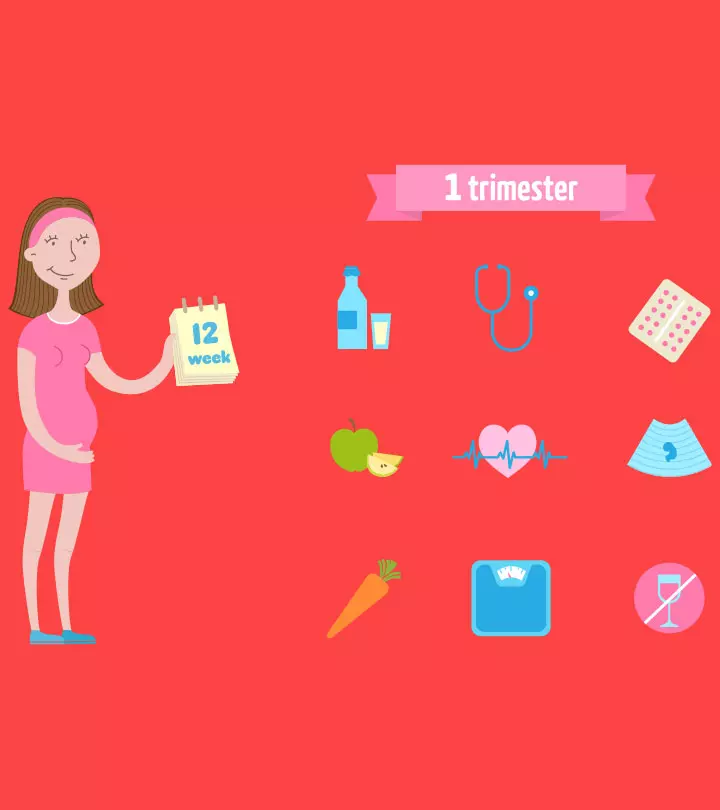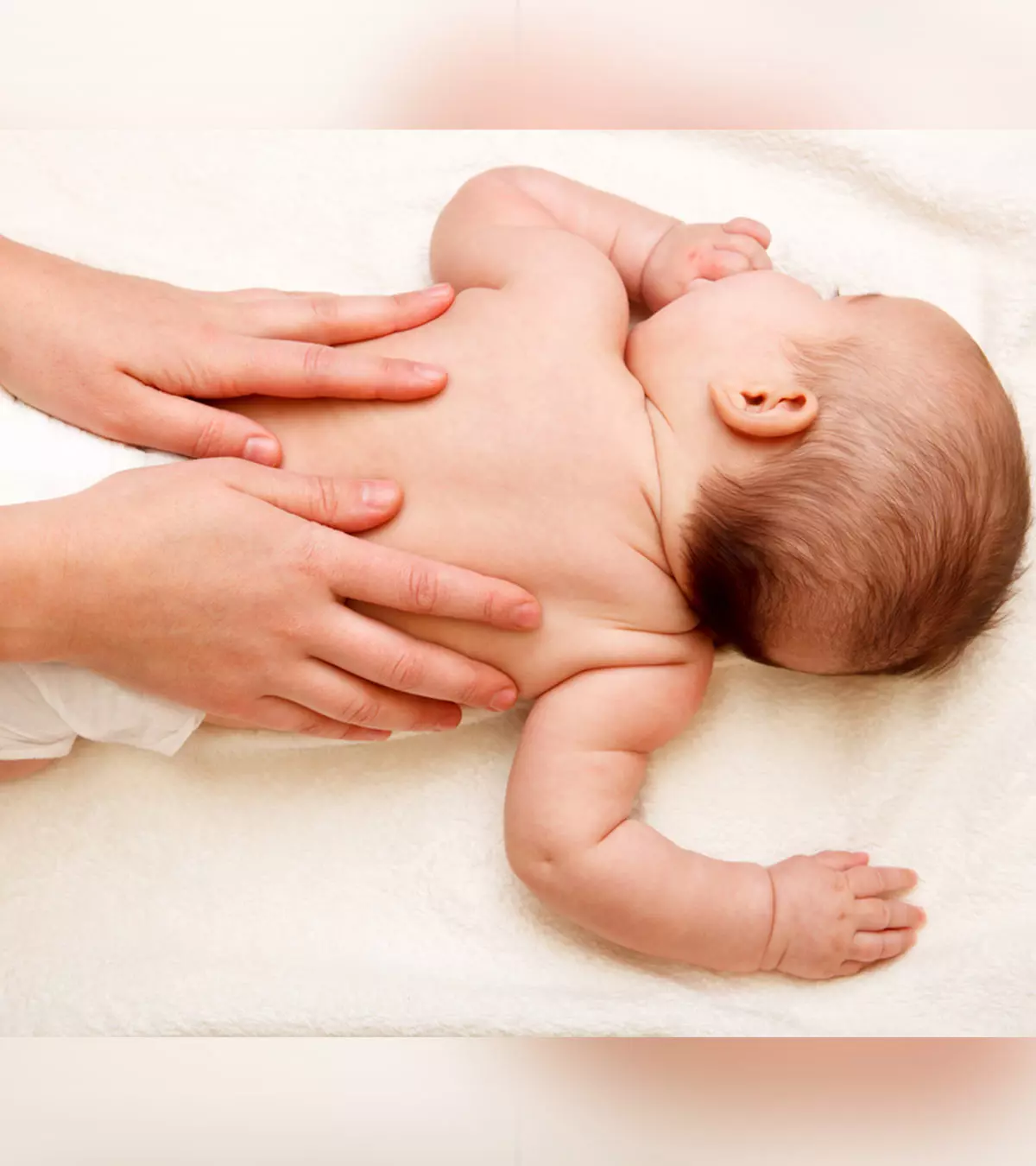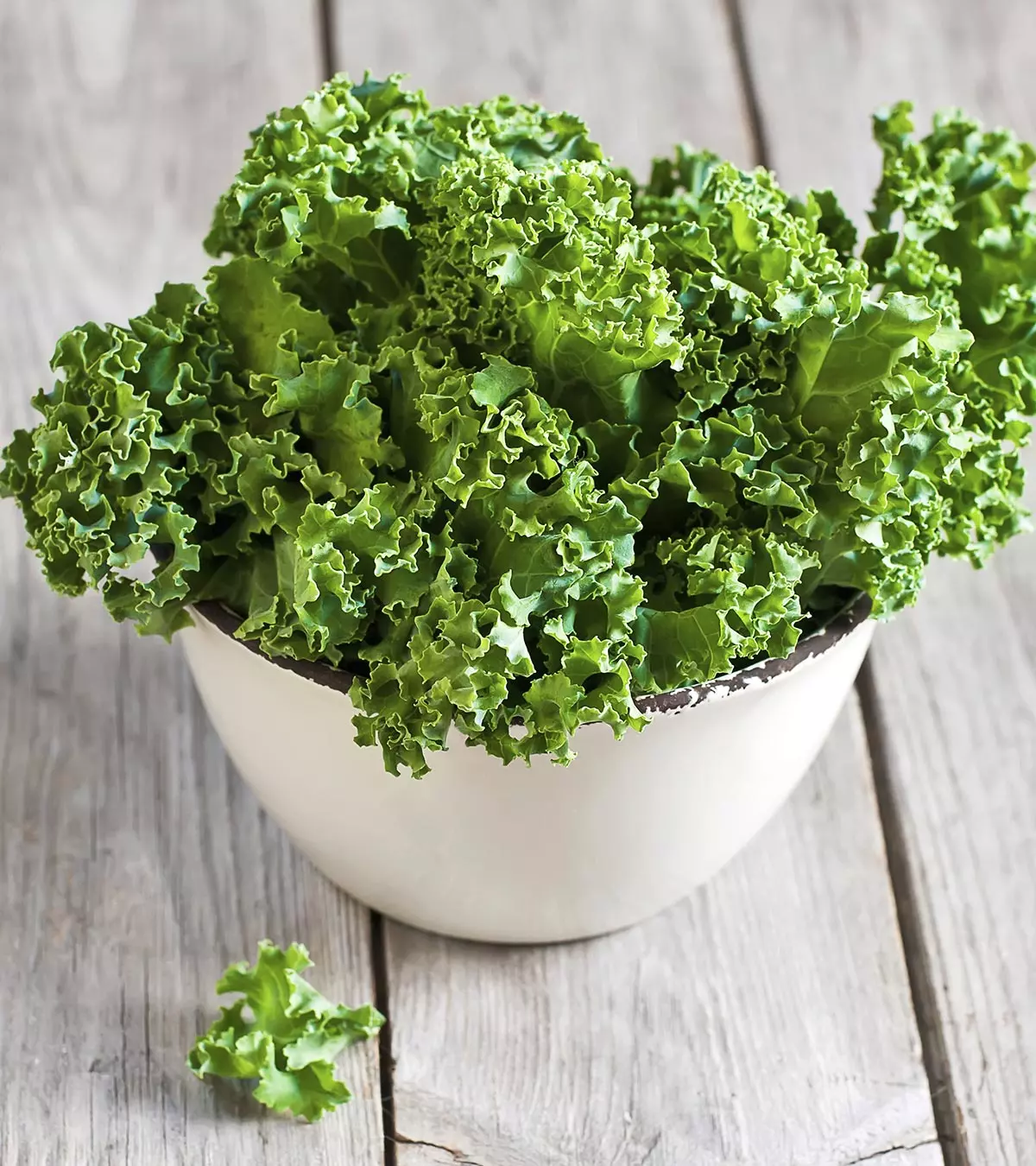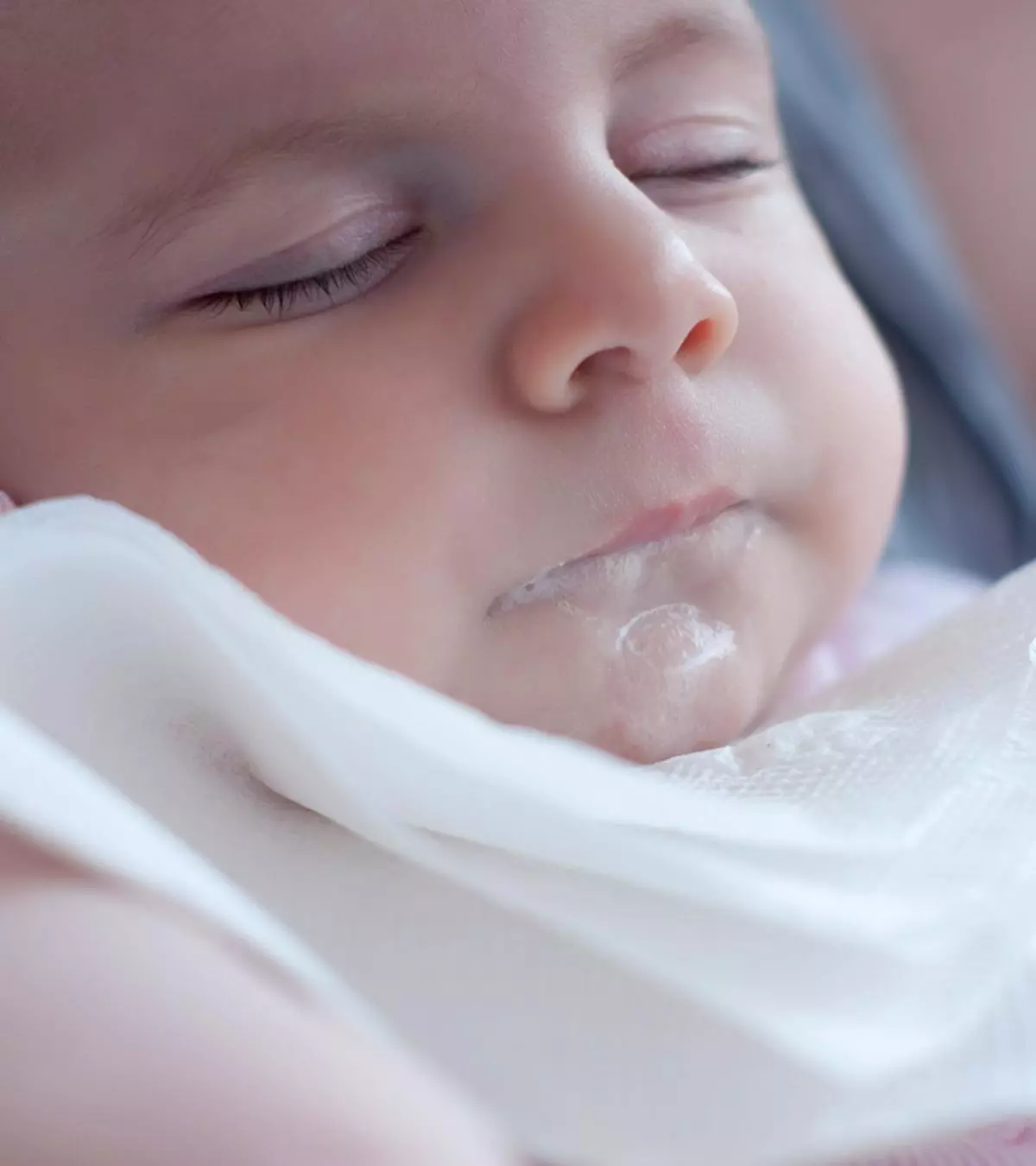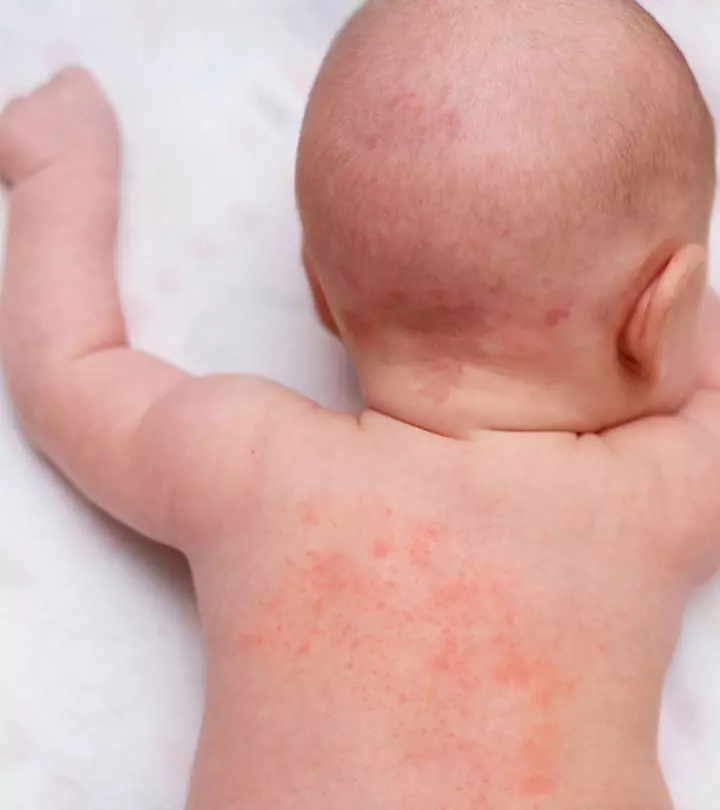
Image: Midjourney/ MomJunction Design Team
An immature digestive system or poor valve closure (pyloric sphincter) in the upper end of the stomach is responsible for your baby spitting up mucus or milk. While it is normal for babies to spit up occasionally, it may be a cause for concern if it happens quite often. However, many factors can cause it to happen often, and it can be treated based on the underlying cause.
Read this post to know why your baby spits up mucus and some management options for this condition.
Key Pointers
- Babies may spit up mucus due to many reasons, from overfeeding to underlying conditions such as pyloric stenosis.
- Feeding adequately, burping them, and offering teething toys may reduce some incidences of mucus spitting in babies.
- Seek medical care if your baby spits up frequently and the remedies are not helping.
How Normal Is It For A Baby To Spit Up Mucus?
While it is normal for babies to spit up mucus or milk occasionally, you should be concerned if it becomes a repeated occurrence (more than a few times a day). If the mucus contains traces of blood or you notice signs of distress or irritation in your baby, it is important to seek medical attention.
So, what could be the possible reasons behind babies spitting up mucus? Read the next section to find out.
 Did you know?
Did you know?Why Do Babies Spit Up Mucus?
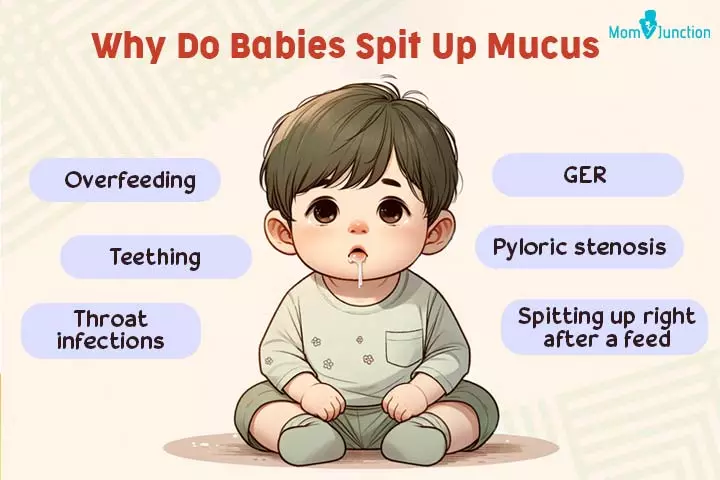
If you notice that your infant or baby spits up clear liquid or is regurgitating milk or food, it’s likely just a result of an immature digestive system and not a cause for concern. However, there could be other reasons as well. Let’s find out.
1. Overfeeding
As your baby’s digestive system is underdeveloped, it may struggle to handle extra food. So, if you are overfeeding, spit up or vomiting in babies can occur as a result of the excess food.
If your baby vomits, do not force-feed them to compensate for the vomited food, as it would only lead to more vomiting.
2. Spitting up right after feeding
Sometimes, you might find your baby spitting up clear liquid just after feeding. You might also find secretions that are white, milky, or clear after burping. This could be due to their developing digestive system.
3. Teething
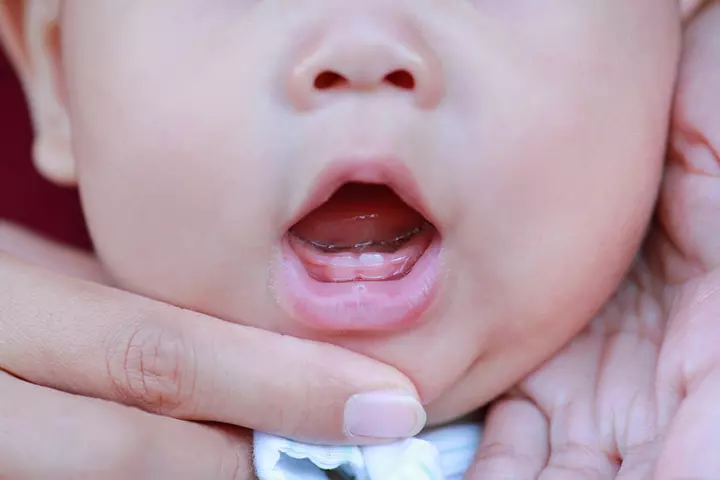
Babies usually start teething between six and twelve months. It can cause major discomfort for the baby. One of the common symptoms of teething is drooling. The salivary reflex is stimulated by eruptions of teeth during teething, which results in excess production of saliva (2).
Sometimes, babies can also spit up the excess saliva in the form of a clear liquid. In case your baby spits up more than usual while teething, look out for occasional coughing or gagging and skin rashes around the mouth, cheeks, chin, and neck area (3).
4. Gastroesophageal reflux (GER)
GER is a condition in which the contents of the stomach flow back into the esophagus. It generally occurs due to the underdeveloped lower esophageal sphincteriA high-pressure zone that protects the esophagus from highly acidic stomach secretions in babies. The condition occurs in 40–65% of infants between the ages of one and four months.
In the case of GER, you would notice your baby spitting up mucus and vomiting due to the forceful expulsion of gastric material from the mouth. Besides spitting up and vomiting, if you find your baby gagging continuously, crying excessively (coliciFrequent, prolonged, and intense crying by an otherwise healthy baby with no apparent cause of distress ), having trouble swallowing, or feeling irritable after feeding, it could be GER (4).
GER is common in infants. As the graph depicts, children till the age of one can be affected by GER, and incidence was higher (59%) in infants at three months of age (12).. The prompt diagnosis of GER in babies relies on identifying the signs and symptoms and can be difficult as these symptoms are non-specific such as spit up of mucus.

Occurrence of Gastroesophageal Reflux (GER) and Gastroesophageal Reflux Disease (GERD) in infants aged 1-12 Months
Source: Natural history of gastroesophageal reflux in infancy: new data from a prospective cohort; BMC Pediatrics Quick fact
Quick factDavid Seitz, MD, a board-certified physician in New York, says, “There are many potential reasons why your baby’s spit up may be thick and mucus-like. It could be a sign of an allergy or intolerance, gastroesophageal reflux disease (GERD), or simply a sensitivity to certain foods.”
5. Pyloric stenosis
This is a condition of the gastrointestinal tract that may cause your baby to spit up and vomit. In pyloric stenosis, the lower part of the stomach that connects the intestines (pylorus) narrows, preventing the food from the stomach from entering the small intestine.
This condition affects three out of 1,000 babies in the U.S., and male babies are four times at a higher risk of developing it than female babies. Babies with pyloric stenosis are not born with it but develop it between three and five weeks of life. Although the exact cause is unknown, it is seen in babies whose mothers took antibiotics during the end of pregnancy or breastfeeding.
Along with spitting, you may also notice projectile vomiting, which is characterized by the forceful ejection of breast milk or formula from the mouth, fewer and smaller stools, failure to gain weight, and lethargy (6).
6. Throat infections
Sometimes, throat infections can also lead to the spitting up of mucus in babies. One such infection is epiglottitis, a severe infection of the flap of tissue above the vocal cords. It generally covers the windpipe during swallowing. Along with drooling and spitting, this condition also causes severe sore throat and fever (7). Note that your baby requires emergency care if they have this condition, as it could shut off the airway.
How To Stop A Baby From Spitting Up Mucus
Spitting up mucus or milk is normal in babies and does not need any special attention. It might subside once your baby’s digestive system matures to handle the food. However, if your baby often spits up and shows additional symptoms, consider following the tips mentioned below.
- Keep your baby’s feeding patterns in mind, and do not overfeed them. One way to deal with this is to decrease each feeding quantity while increasing the frequency of feeding. This would help your baby get the necessary nutrients while giving their immature digestive tract enough time to process food.
- If the spitting up is due to teething, try to give your baby a frozen teether to chew on, gently massage your baby’s gums with a clean finger, and continue to breastfeed to help soothe their sore gums.

- To keep GER symptoms in check, try to elevate your baby’s head after feeding, ensure you burp your baby after each feeding, and thicken the formula milk after consulting with your pediatrician.
- Talk to your pediatrician if your baby is diagnosed with more severe issues such as pyloric stenosis or bacterial infections.
- If your baby’s nose is filled with mucus, they may not know how to sneeze and get it out. So, when the mucus enters the throat, they might swallow or spit it up. To prevent this, you can suck mucus out of your baby’s nose using a bulb syringeiA tool used to suck out mucus from a baby’s nose gently .
According to Dr. Seitz, “Make sure they’re getting plenty of fluids. You can do this by breastfeeding them or offering extra formula if they’re bottle-fed. Additionally, you can try using a saline nasal spray or drops to help loosen any congestion. Finally, make sure your baby is getting plenty of rest to help them recover from whatever is causing their mucus production.”
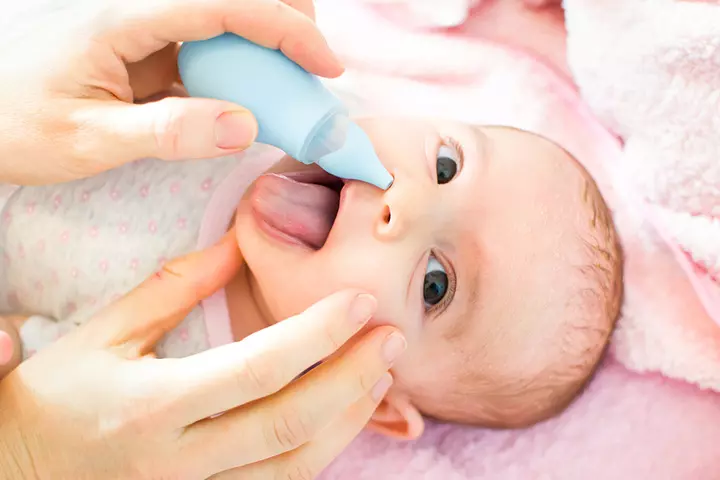
When To Call Your Doctor?
Call your doctor if (8)
- You notice faint blood traces in the spit-up. This could be due to the inflammation of the esophageal tissue. Baby spitting up blood that is dark brown also warrants prompt medical attention.
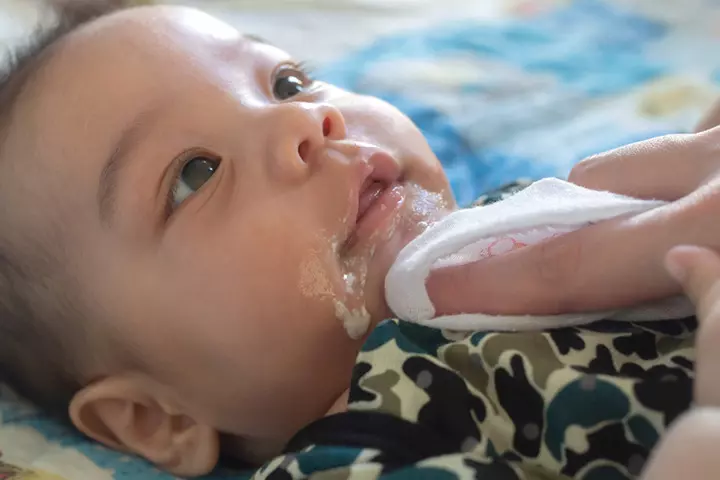
- Your baby spits up milk that turns blue. This could be due to an airway or intestinal obstruction.
- Your baby is less than 12 weeks, and the spitting up of mucus has changed to vomiting.
- You notice signs of epiglottitis in your baby.
- The baby is not gaining weight or stops gaining weight.
- The baby is lethargic and has trouble feeding.
Dr. Seitz suggests, “If your baby is regularly spitting up thick, mucus-like spit, it’s important to talk to your pediatrician to rule out any underlying health conditions. Allergies and intolerances can be treated with dietary changes, while GERD may require medication.”
If you ever feel uncertain about your baby’s health, don’t hesitate to contact your pediatrician, even if the symptoms seem mild.

 Be watchful
Be watchfulFrequently Asked Questions
1. What does it mean when a baby is spitting and coughing up mucus?
Coughing up and spitting mucus can signify lower respiratory tract infections such as bronchitis. This can be caused by a respiratory syncytial virus (RSV) in infants. High fever and other symptoms can be associated with productive cough in case of pneumonia or more severe infections (9).
2. What does a baby spitting up green mucus mean?
Green mucus indicates that the white blood cells fight against the pathogen, causing infection. Usually, the green mucus becomes clear in a few days. If your baby is coughing up green mucus for more than a few days, they may require antibiotic treatment as per the pediatrician’s prescription (10).
3. Why does my baby persistently spit up mucus?
There can be various reasons for a baby to spit up mucus continuously. Swallowing excess mucus due to allergies and infections can make the baby spit up mucus. Spitting up mucus may resolve as the baby grows older and their digestive system matures.
4. Should I give my baby water to help with spitting up?
Dr. Seitz says, “It’s generally not recommended to give babies water unless instructed to do so by a medical professional. Babies have a very delicate digestive system, and giving them water can interfere with their ability to absorb the nutrients they need from breast milk or formula.”
5. How do I get mucus out of my baby’s chest?
Chest congestion in your infant could be relieved with gentle taps on their back. For that, place the baby across your knees and use your cupped palm to gently pat their back. Alternatively, you can make the baby sit in your lap and lean back at a 30-degree angle, with their back resting on a pillow on your lap. Then, use gentle taps and vibrations over the area between the top of the shoulder blade and collarbone on both sides to loosen mucus in the chest and make it easier for the baby to cough up (11).
6. Is Baby spitting up curdled milk good or bad?
Baby spitting up curdled milk is generally not a cause for concern. Experts suggest that normal spit-up can take on various appearances, such as clear, white, yellow, curdled, non-curdled, or it may even look like mucus (12).
An immature digestive system could result in the baby spitting up mucus. It is normal if it happens occasionally. However, frequent spitting up may indicate underlying problems. While a few of the reasons could be harmless, like teething or overfeeding, other reasons such as GERD or throat infections could cause complications if not treated promptly. Talk to a pediatrician regarding the causes of the spitting and make changes in their feeding pattern accordingly. With these changes, the spitting up might subside on its own. However, if you notice any other concerning signs, consult a doctor for prompt medical attention.
Infographic: More About Laryngomalacia In Infants
Certain malformations in the nose, mouth, or throat may cause breathing difficulties in your baby, making them gasp for air. Laryngomalacia is a congenital condition that is the most common cause of noisy breathing in babies. The infographic below explains the causes, symptoms, and treatment of the condition. Illustration: Momjunction Design Team
References
1. Signs of Respiratory Distress in Children.
2. Alexander KC Leung and C Pion Kao; Drooling in children; Paediatrics Child Health (1999).
3. Your Infant is Teething: Know the Signs and Symptoms; Children’s Hospital Los Angeles
4. Anna Rybak et al.; Gastro-Esophageal Reflux in Children; International Journal of Molecular Sciences (2017).
5. Acid Reflux (GER & GERD) in Infants; National Institute of Diabetes and Digestive and Kidney Diseases
6. Chapter X.8. Hypertrophic Pyloric Stenosis; Department of Pediatrics, University of Hawaii
7. Sore Throat; Seattle Children’s Hospital
8. Spitting Up – Reflux; Seattle Children’s Hospital
9. Here’s what your baby’s cough could mean; Texas Children’s Hospital
10. The Skinny On Snot: What Your Child’s Mucus Says About Their Health; Health University Of Utah.
11. Chest Physical Therapy; Cystic Fibrosis Foundation
Community Experiences
Join the conversation and become a part of our nurturing community! Share your stories, experiences, and insights to connect with fellow parents.
Read full bio of Dr. Richard Mario Lurshay
- Dr. David Seitz is the Acting Medical Director of Ascendant NY, an OASAS-certified chemical dependency treatment program. With over 30 years of experience, he previously worked at Inter-Care, New York Presbyterian Hospital, and as medical director of The Recovery Center at Nyack Hospital.
 Dr. David Seitz is the Acting Medical Director of Ascendant NY, an OASAS-certified chemical dependency treatment program. With over 30 years of experience, he previously worked at Inter-Care, New York Presbyterian Hospital, and as medical director of The Recovery Center at Nyack Hospital.
Dr. David Seitz is the Acting Medical Director of Ascendant NY, an OASAS-certified chemical dependency treatment program. With over 30 years of experience, he previously worked at Inter-Care, New York Presbyterian Hospital, and as medical director of The Recovery Center at Nyack Hospital.
Read full bio of Dr Bisny T. Joseph
Read full bio of Rohit Garoo
Read full bio of Shinta Liz Sunny














